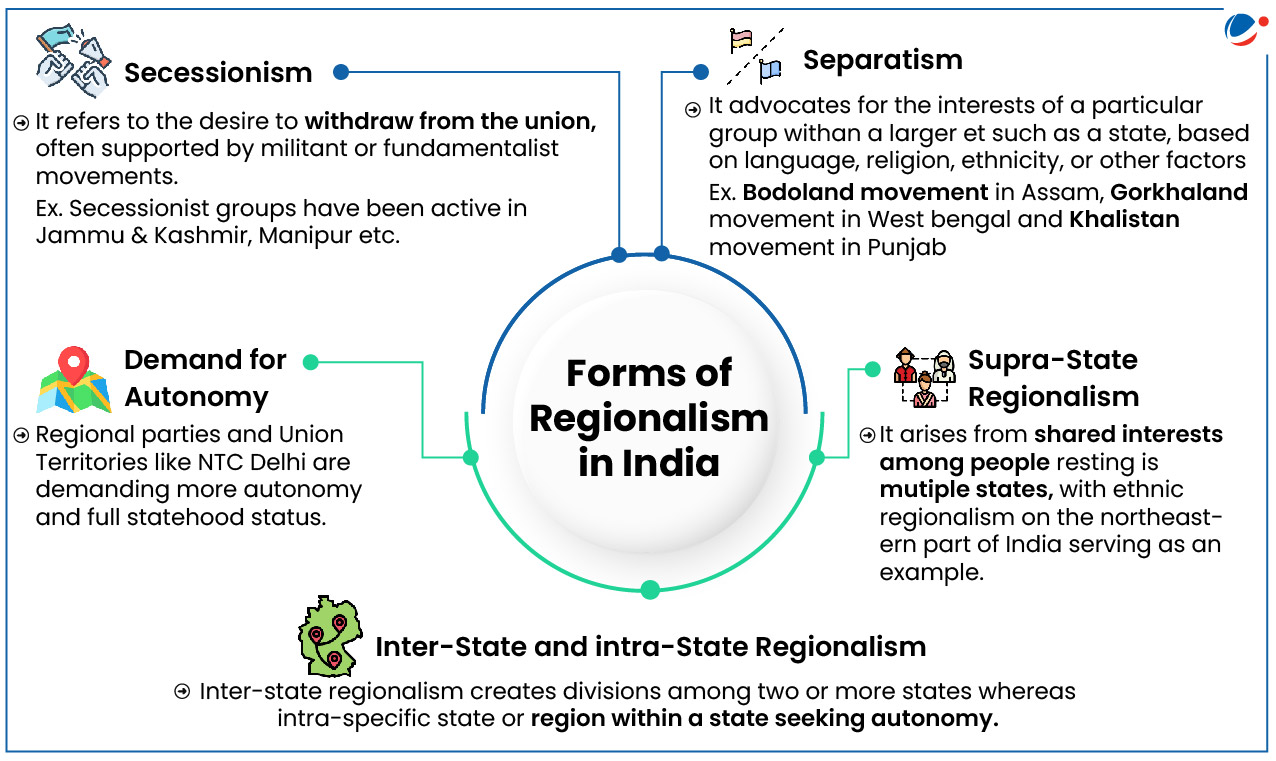Why in the News?
Vice-President raised concerns about the forces that are trying to create a clash between nationalism and regionalism.

Regionalism
- Shared Identity: Regionalism reflects a shared sense of identity among people in a specific geographical area.
- It often originates among groups in particular areas due to distinct ethnic, linguistic, economic, and cultural consciousness.
- Evolution in India: Roots of regionalism in India can be traced back to the colonial period which deepened regional disparities across the country.
- First form of regionalism in post-independent India was the demand for the creation of linguistic states, sparked by the hunger strike of Potti Sriramalu, who fasted unto death in 1952.
- Later on, the creation of the states of Jharkhand, Chhattisgarh, and Uttarakhand in 2000, and formation of Telangana state separated from Andhra Pradesh in 2014, are some of the recent chapters in the trajectory of regional movements in India.
Factors Behind Regionalism
- Linguistic and Cultural Identity: For example, the Dravidian movements in Tamil Nadu stemmed from linguistic identity.
- Ethnocentrism: Natives presume that they possess the authenticity over the regional issues and they imagine a sort of body politics that includes themselves and exclude the 'other' as outsiders.
- For instance, the construct of Marathi Manoos, which is meant to imply those persons who are natives of Maharashtra belonging to Maharashtra, thus excluding persons of other states.
- Tribal Identity: Socio-economical differences in tribal life accentuates regional tendencies.
- Rationale for creation of state of Jharkhand was partly based on its tribal cultural heritage.
- Unequal distribution of resources: For example, Gorkha Nationalist Liberation Forum (GNLF) emerged in Darjeeling due to the feeling of regions underdevelopment compared to South Bengal.
- Development and Administrative Issues: Some regions feel left out while taking policy decisions for the entire region such as water distribution, budget allocations, employment opportunities etc.
- These were driving factors for the formation of state of Telangana from Andhra Pradesh.
Impact of Regionalism (National Unity and Regionalism)
- Positive Impact
- Strengthening Federalism: Promotes a stronger federal structure by encouraging states to assert their rights and seek greater autonomy.
- Enhanced Political Representation: Gives voice to local issues and marginalized communities that national parties may overlook.
- Promotion of Cultural Diversity: Preserves and promote India's cultural, linguistic, and ethnic diversity by championing local traditions, languages and customs, etc.
- Conflict Resolution and Integration: Provides a platform for expressing regional grievances and aspirations within the democratic framework, reducing the likelihood of violent conflicts.
- Negative Impact
- Threat to National Unity: Extreme regionalism can foster divisive sentiments, leading to conflicts between states or between regional and national interests and in extreme cases it also leads to rise of Secessionist Movements.
- Bias and Discrimination: Regionalism often encourages identity-based politics.
- For example, Driven by the spirit of 'Son of the Soil,' demands for job reservations for locals have been raised. There have been many instances where attacks on migrant laborers led to their mass exodus.
- Political Fragmentation: The proliferation of regional parties often leads to fragmented electoral outcomes, making it difficult to form stable governments.
- Prioritization of Regional over National Interests: The narrow focus on regional interests can lead to resource allocation imbalances and policies that serve regional rather than national goals.
Way Forward
- Fostering National Unity: Encourage an inclusive national identity through education programmes and promote cultural exchange programmes.
- Cultural Integration: Frequent cultural contacts should be promoted to break the regional barriers and to develop the nationalist spirit.
- For example, Ek Bharat Shreshtha Bharat programme enhances interaction & promote mutual understanding between people of different states/UTs.
- Strengthening Federalism: Empowering states and local bodies and promoting Cooperative Federalism can help in accommodating regional aspirations within the national framework.
- Inclusive Development: Implement targeted programs and infrastructure projects to boost economic activity and create jobs in under-developed areas.
- Functioning Autonomy: Union Government must not interfere in the affairs of the state unless it is unavoidable for national interest.




